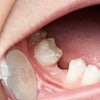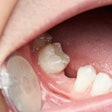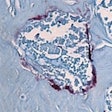A new biomarker for esophageal cancer may improve screening for the disease and its precursor, Barrett's esophagus (BE), according to a study to be presented at the Digestive Disease Week meeting in Chicago.
The findings will be presented May 5 by researcher Amitabh Chak, MD, of University Hospitals Case Medical Center's Seidman Cancer Center and Case Western Reserve University School of Medicine in Cleveland. The study will be presented in the forum "Aberrant Vimentin Methylation in Esophageal Brushings: A Biomarker for Detecting Barrett's Esophagus and Esophageal Adenocarcinoma."
Checking for a change in the DNA, methylation of the vimentin gene, can be an effective, less invasive test for detecting BE, Dr. Chak and his research team found.
In a study group of 117 patients, the researchers investigated whether a new, nonendoscopic "brushing" of the esophagus is as effective as the more invasive, traditional biopsy.
The research builds upon previous work by the team that aberrant vimentin methylation is a highly common epigenetic alteration in neoplasia of the upper gastrointestinal tract. In this study, they analyzed esophageal specimens in patients with BE, patients with esophageal cancer, and control subjects. The data determined that methylated vimentin is a highly sensitive biomarker for Barrett's esophagus and that the less invasive brushing technique can effectively detect these changes in the DNA.
BE affects about 6.8% of the population and is a leading predictor of esophageal cancer. Compared with the general population, patients with BE have an 11-fold higher risk of developing adenocarcinoma of the esophagus.
"Despite the fact that the rates of common cancers have declined in recent years, esophageal cancer has a poor five-year survival rate of less than 15%," Dr. Chak stated in a press release. "Early detection through screening can prevent the development of esophageal cancer. This promising new test has important clinical implications through its potential to improve screening and decrease mortality from this deadly disease."
"Our team's hope is that the use of molecular markers for nonendoscopic screening will drive down the cost and increase the ease of screening for these early esophageal lesions that can give rise to cancer," said Dr. Markowitz, an oncologist at University Hospitals Case Medical Center Seidman Cancer Center and Ingalls Professor of Cancer Genetics at Case Western Reserve School of Medicine. "Longer term we hope to find additional markers that will allow the same approach to be used in the monitoring of Barrett's patients to detect early progression to more advanced disease."
"This is true translational research, bringing a discovery from the laboratory to the patient care setting," Dr. Chak said. "This new technique to sensitively detect changes in the DNA may have significant implication for the clinical practice of screening and primary prevention of esophageal cancer."


















